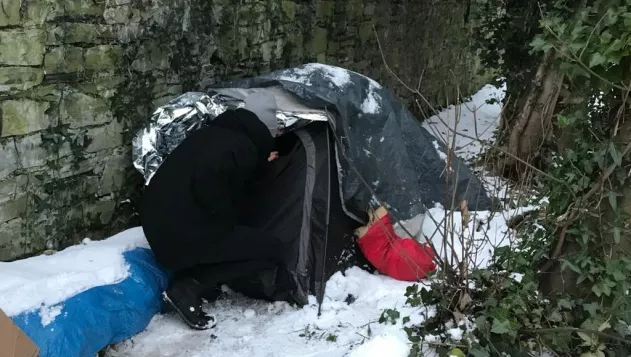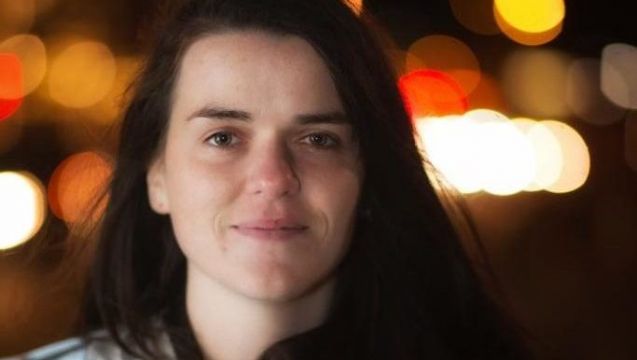“Trying to convince someone to go to hospital when you know they are on deaths' door, and they refuse for whatever reason, that can be a difficult situation to be in,” says Sinéad Grogan.
Sinéad works as an outreach clinical nurse manager with Safetynet Primary Care, helping to provide healthcare to rough sleepers or other homeless people without access to services.
“I’ve worked in the homeless sector for 11 years now,” she says.
“The patients that you meet and their stories, it can be very sad, but it’s also just a privilege to be in that position.
“It keeps you grounded. I’m so surprised sometimes at the stories I hear from people who just came on bad luck really and ended up in the circumstances they are in.
“It makes you see that it can be just around the corner from yourself.”
Safetynet's mobile health unit operates three nights a week to provide outreach care. It is staffed by a GP and nurses.

“Usually when I get into the office, I will have follow up to do from the outreach shift that was on the night before,” Sinéad says.
“My job is so diverse, every day is different, which is something I really like about it, and it can be very unpredictable.
“Depending on the day I would do a walkabout outreach.
“It’s sometimes better to link in with people early in the morning.
“In the evenings you kind of catch people at a different time, they might be bedded down ready to go asleep, or they might be tapping, so they don’t really want to be disturbed because it’s a good time for them to make money.
“Myself and a GP would go out with two members of the outreach team that work with Dublin Simon [Community], and we would do a walkabout around the city to people that we feel would benefit more from a daytime visit.
“Most cases it is those that are kind of hard to reach, so they might be in a place that is difficult to access at nighttime.
“Or if it’s a mental health concern it’s better to go and see them during the day just because it's not dark. You don’t want to freak them out or scare them, you don’t want to cause any more stress than you should.”
Meeting people where they are at
Although Sinéad’s job revolves around helping those who need it, there are times she faces rejection, with some people not wanting to engage with services.
“That can be the difficult part of my role, accepting that,” Sinéad says.
“I suppose from our point of view we are the health professionals, and we don’t just solely focus on the health issue, but sometimes that is our main concern.
“You kind of try to always meet them where they are at, and I suppose we are lucky now that we have good relationships with the two main hospitals in Dublin – James's and the Mater.
“They have social inclusion health teams that are consultant led in each one and there would be nurses on those teams that we would liaise with very closely and if we are sending some into A&E we would contact them.
“We would let the patient know that we have contacted someone and if we can go with the patient we will, and we will introduce them to the nurse there.
“Just that friendly face and encouragement to go because it can be scary for people.
“When the addiction comes into it, they are afraid they are going to be dying sick, [that] is what they would say to us if they are left sitting in A&E for hours and their addiction needs aren’t met in A&E...they’ll leave because they have to.
“We would always try to make sure there is a plan in place so when they get to ED, and they are assessed, maybe they are given a small dose of methadone, that kind of thing just to try and keep them there.
“It’s a lot of communication between services to try and best serve the patient and meet them where they are at, that is what we are always trying to do.”
Building trust
Working with people in quite vulnerable situations, a major part of Sinéad’s work is building up relationships and a level of trust with people.
“It can take weeks just to get someone to say two words to you, they see you coming, and they just don’t want to know,” she says.
“I can understand, someone who is out rough sleeping they probably have multiple different services approaching them 24/7, so it can probably get a bit annoying for us to be bothering them.
“It’s just about being consistent and turning up.
“We would have certain people we would go to every single week… you still go back even if they tell you to F off or go away.
“I was working with a patient for four years; he was an entrenched rough sleeper… he was about 20 years sleeping out on the streets in various different situations.
“I remember the first time I ever met him, he wouldn’t even talk to me, he would run away from me.
In that particular case, it was really a case of self-neglect, and it was difficult.
“We did everything we could to a point, he had a property, but he wouldn’t use the property.
“I went into the flat and put a sleeping bag on the ground. I was trying to make it... like familiar… and a safe space, but he just wouldn’t use it.
“He would be back out rough sleeping, and he’d be found in an awful state.
“We would go out to him every week. All we could do was make him comfortable in the situation he was in.
“He was never going to take a house or a flat. He was happy to rough sleep and just have his drink day to day.
“So, the best thing we could do was just to make sure he was comfortable and safe. We would go out every week and check him over, check his vitals, wash him down and change his clothes and he would be happy out.
“But that is a big commitment in itself. They can be difficult cases, but you just have to do the best you can.”
Sinéad adds that the man died in Autumn last year.
“I don’t feel like I didn’t do enough for him. That’s the difficult piece, we have to respect his choices.”







